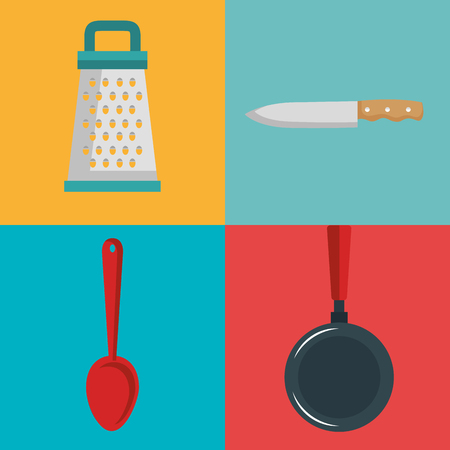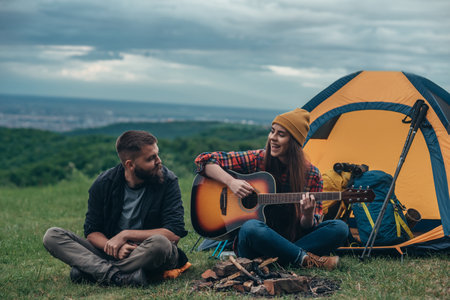Understanding British Campsite Cooking Needs
Cooking outdoors in Britain isn’t just about making do—it’s about embracing a range of landscapes and traditions that shape the way we eat when camping. From the misty peaks of the Lake District to the windswept cliffs of the Cornish coast, each region brings its own quirks and challenges to campsite cooking. The unpredictable British weather, with sudden downpours or chilly evenings even in summer, means your cookware has to be reliable, versatile, and easy to use in all conditions. Local customs also play a role—think hearty stews simmered over a fire in Scotland, or fresh seafood grilled on a portable BBQ by the sea in Devon. Whether you’re wild camping in Snowdonia or pitching up at a family-friendly site in the Cotswolds, understanding these unique needs is the first step towards choosing cookware that won’t let you down when it matters most.
2. Material Matters: Comparing Cookware Types
When choosing cookware for camping across Britain, the material really does matter. The right choice can mean the difference between a faff-free fry-up and a burnt breakfast in a soggy field. Here’s a practical breakdown of the four most popular materials you’ll find in British campers’ kits, along with their pros and cons for use at UK campsites.
| Material | Pros | Cons | Best For |
|---|---|---|---|
| Stainless Steel |
|
|
Family car camping, group trips, those who value durability over weight |
| Aluminium |
|
|
Solo travellers, backpackers, festival-goers packing light |
| Non-Stick Coated |
|
|
Campsites with washing-up facilities, casual campers, those prioritising ease over longevity |
| Cast Iron |
|
|
Bushcraft enthusiasts, glampers, static caravans, and anyone who loves campfire cooking classics like fry-ups or cobblers |
The British weather—and your style of camping—should guide your choice. If you’re braving Dartmoor’s winds or pitching up by the Northumberland coast, go for durability. For lightweight adventures along Hadrian’s Wall or multi-day hikes through Scotland’s Munros, aluminium or non-stick will save your back. And if you love classic campfire cuisine and don’t mind a bit of elbow grease, cast iron never goes out of style. Choose wisely based on where you’re headed and how much kit you want to carry.

3. Packability and Weight: Travelling Light Across the Isles
If you’re planning to explore Britain’s diverse landscapes—from the rugged Scottish Highlands to the rolling hills of the Lake District—easy-to-carry cookware is an absolute must. For hikers, wild campers, or anyone moving between campsites on foot, every gram counts. Lugging heavy pots and pans simply isn’t practical when your journey involves trekking across moors, climbing fells, or navigating woodland trails.
Compactness is just as crucial as weight. Space in your rucksack is at a premium, especially when you’re packing for unpredictable British weather and need to save room for essentials like waterproofs, extra socks, and a decent brew kit. Nesting cookware sets—where pots, pans, and even mugs slot neatly inside each other—are perfect for minimising bulk without sacrificing versatility. Look out for collapsible silicone bowls and lightweight utensils too; these bits of kit are game-changers for keeping your pack tidy and manageable.
Don’t forget that some British campsites are quite remote or only accessible by footpaths, so being able to stash your cooking gear efficiently can make or break your experience. Aluminium and titanium options are popular with UK wild campers thanks to their feather-light build and durability—even after a few rough-and-ready meals cooked over a portable stove or campfire. Ultimately, choosing cookware that’s both light and packable means you’ll have more energy to enjoy the stunning British countryside rather than wrestling with cumbersome kit.
4. Cooking Methods: From Open Fires to Portable Stoves
When camping across Britain, your choice of cookware should reflect the variety of cooking methods you’ll encounter at different sites—from classic open fires in rural Scottish glens to portable stoves on managed campsites in Cornwall. Not all UK campsites allow open flames, so it’s essential to check site rules before packing your kit. Here’s a quick look at compatibility between popular cookware types and common British campsite cooking setups:
| Cooking Setup | Allowed at Most UK Sites? | Best Cookware Types | Practical Tips |
|---|---|---|---|
| Open Fire Pits | Sometimes (check local/site rules) | Cast iron pans, steel grills, Dutch ovens | Choose heavy-duty gear; avoid non-stick coatings that can burn off. |
| Charcoal BBQs | Often permitted with raised platforms | Stainless steel grates, enamelled trays, grill baskets | Look for easy-to-clean options; ensure handles are heat resistant. |
| Portable Gas Stoves | Almost always allowed | Aluminium pots, non-stick frying pans, lightweight kettles | Opt for compact, quick-heating cookware; foldable handles are handy. |
| Multi-Fuel/Spirit Stoves | Permitted at most wild camping spots | Titanium mugs, hard-anodised pots, nesting sets | Prioritise lightweight and stability on uneven ground. |
Cultural Tip: In true British style, many campers swear by a classic “brew up”—so don’t forget a sturdy kettle or billy can for tea! When deciding what to pack, think about your menu: is it bacon and eggs over an open fire in Wales, or quick pasta on a windproof gas stove along the Lake District? Matching your cookware to your planned cooking method ensures fuss-free meals and lets you enjoy those iconic British landscapes with minimal hassle.
5. Weathering the Elements: Durability in the British Outdoors
If you’ve ever pitched your tent on a windswept moor or woken up to drizzle seeping through the canvas, you’ll know that British weather is nothing if not unpredictable. When choosing cookware for campsites around Britain, durability should be right at the top of your checklist.
Rust Resistance Matters
The damp conditions common across the UK mean that rust can quickly turn your favourite pan into a write-off. Opt for stainless steel or hard-anodised aluminium, which both shrug off moisture and are less likely to corrode. Cast iron is another robust option if you’re happy with a bit more weight, but remember it needs regular seasoning and drying to prevent rust spots, especially after a rainy night.
Easy to Clean—Even in the Mud
Muddy boots and wet grass are part and parcel of British camping, so cookware that cleans up easily is a must. Non-stick coatings can save you precious time scrubbing by the tap block—just make sure they’re tough enough to withstand metal utensils and occasional knocks on stony ground. Smooth surfaces and simple designs also help; avoid fiddly rivets or ridges where grime can build up.
Handles That Hold Up
Don’t overlook handles—plastic ones can crack in cold snaps, while silicone or sturdy metal stays reliable whatever the forecast throws at you. Foldaway designs are handy for packing but check they lock firmly in place for safe cooking over an open flame or portable stove.
A Quick Dry-Off Goes a Long Way
After a rainy cookout, dry your pans thoroughly before packing them away. Even the best materials can suffer from neglect in soggy rucksacks. Keeping a microfibre cloth in your kit helps ensure everything’s ready for the next meal, no matter what weather rolls in overnight.
In short, when it comes to cookware for British campsites, think resilience: choose pieces that handle wet, mud, and chill without fuss, letting you focus on enjoying your outdoor adventure rather than wrestling with rusty pots or stubborn stains.
6. Practical Recommendations: Top Picks for UK Campers
When it comes to kitting out your camp kitchen for British adventures, it pays to choose cookware that’s not only reliable but also easy to find in local shops and offers good value for money. After extensive hands-on testing and chatting with fellow UK campers, here are some tried-and-true suggestions that consistently stand out.
Trangia Storm Cooker Series
Beloved by both wild campers and family holidaymakers alike, Trangia sets are a staple for British campsites. The classic Swedish design is lightweight, robust, and simple to use even in blustery British weather. The non-stick versions make cooking and cleaning up less of a faff, and spare parts or fuel bottles are widely available at outdoor retailers like Go Outdoors or Cotswold Outdoor.
Vango Non-Stick Cook Set
If you’re after something budget-friendly yet practical, the Vango non-stick cook set is often top of the list. It’s compact enough for backpackers but large enough for group meals. The heat-resistant handles and nesting design make it ideal for space-saving in your boot or rucksack. Plus, Vango gear is easy to pick up at most high street camping shops or online from Argos and Decathlon.
Jetboil Flash Cooking System
For solo campers or those who prioritise speed, Jetboil’s Flash system is hard to beat. Boiling water in under two minutes is a game-changer when you’re desperate for a brew on a chilly morning in Snowdonia or the Lake District. While the initial outlay is higher, British campers rate its efficiency and portability, especially as compatible gas canisters are found in most petrol stations across the country.
Cadac Safari Chef 2
Perfect for car campers or those setting up a base for several days, the Cadac Safari Chef 2 is often spotted on UK campsites. Its versatility—grilling, frying, boiling—makes it a favourite for family trips to Cornwall or the Scottish Highlands. It packs down neatly and runs on commonly available gas cartridges, with spares readily sourced from Halfords or local hardware shops.
Local Favourites: Wilko Stainless Steel Pans
If you’re caught short or just want to keep things simple, Wilko’s range of stainless steel pans are durable, cheap as chips, and available on almost every high street in Britain. They might not have all the bells and whistles of specialist brands but they’ll handle anything from beans on toast to a full fry-up.
Final Thoughts
No matter where you pitch up across Britain—from breezy coastal sites to misty moorlands—these cookware picks balance practicality with local availability. By choosing trusted brands and products that suit your style of camping, you’ll spend less time faffing about with gear and more time enjoying the great British outdoors (and maybe a cracking cup of tea).


